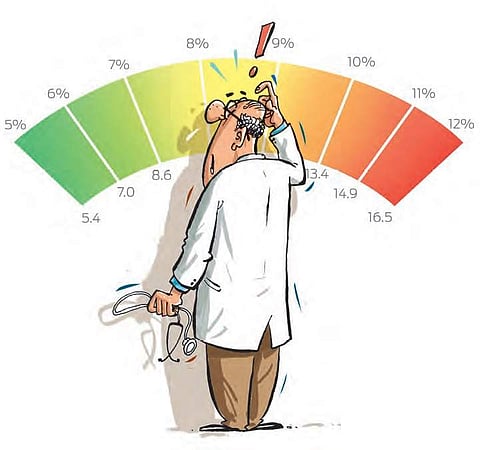

HYDERABAD: The American College of Physicians (ACP) has recommended doctors across the world to set “moderate blood sugar control targets” for treatment of most patients with type-2 diabetes. This has created quite a commotion in the medical community in Hyderabad which sets stringent targets for its patients. City-based endocrinologists and researchers claim the ACP’s recommendations are not based on strong evidence and does not take into its account the newer medications that are available.
“Patients with type 2 diabetes should be treated to achieve an A1C between 7 percent and 8 percent rather than 6.5 percent to 7 percent,” says the ACP recommendation. An A1C test measures a person’s average blood sugar level over the past two or three months. The College further says that the rationale that was being cited to lower the treatment targets -- below 7 per cent or below 6.5 per cent -- was that more intensive blood sugar control would reduce microvascular complications over many years of treatment.
“However, the evidence for reduction is inconsistent and reductions were seen only in surrogate microvascular complications such as the presence of excess proteins in the urine,” claimed the ACP.
Does that mean people whose A1C falls between 6.5-7 per cent can be spared from medication and asked to improve their condition through just dietary and lifestyle modification? Clinicians here disagree.
City-based specialists continue to follow the American Diabetes Association’s guidelines where a person is recommended to undergo treatment if his A1C levels are above 6.5 per-cent when checked twice with gap of one or two-months. They claim that if the blood sugar control targets are relaxed, it could harm people’s health.
“For every one per-cent increase in A1C levels, risk of the diabetes complication increases. The main intention of treatment is to control the complications (Microvascular and Macrovascular) such as Retinopathy, Neuropathy, kidney disease and diseases related to heart and brain. Most of the patients who develop kidney diseases and undergo dialysis is because of diabetes,” said Dr Shiva Raju, senior consultant physician at KIMS Hospitals.
Besides, Research Society for the study of Diabetes in India (RSSDI) Clinical Practice recommendations for the management of Type-2 Diabetes mellitus-2017 advises people that maintaining A1C below 7 per-cent minimizes risk of developing complications. The ACP recommendations are only based on a critical analysis of the current guidelines and do not present any new evidence, said an Endocrinologist Dr V Sri Nagesh, adding, “Unfortunately they have not taken into consideration the newer drugs that have been developed in the past 10-15 years which can help achieve HbA1C below 6.5 without the risks of low blood glucose levels”.Secretary at RSSDI, Dr Brij Mohan Makkar too said that the ACP recommendations are not based on strong evidence, and that RSSDI has its set of recommendations in place.The specialists added that existing guidelines stated that treatment for the disease takes into account age, sex, profession and others factors of a person before treatment.